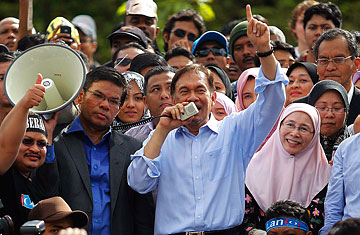
Malaysian opposition leader Anwar Ibrahim talks to his supporters while flanked by his wife Wan Azizah Wan Ismail after he was acquitted of sodomy charges in Kuala Lumpur on Jan. 9, 2012
Wild scenes erupted around Malaysia's High Court on Monday after opposition leader Anwar Ibrahim was acquitted of sodomy charges. Critics had long claimed that the case was an attempt to sideline the charismatic politician ahead of national elections expected later this year. The 64-year-old's supporters greeted the news with shock and jubilation. Inside the court, family and friends wept for joy. Outside, thousands cheered the decision and the prospect of a profound change to the Southeast Asian country's political landscape. Although the demonstrations were mostly peaceful, police are now investigating three explosions that injured five bystanders outside the High Court building. Police said two homemade bombs were hidden inside police cones and a third was detonated in a rubbish bin. No arrests have been made.
Anwar was mobbed by well-wishers and the press as he emerged from court. Flanked by his lawyers, he thanked his family, party members and the court for its decision, adding that his focus had now shifted to the prospect of contesting an early election. He maintained his innocence throughout the three-year ordeal, but said he expected the court would find him guilty — claiming the sodomy charge by his 26-year-old former aide, Saiful Bukhari Azlan, was politically motivated. "I hope and pray that they respect the rule of law and not be dictated by the corrupt elite leadership," he said before the verdict was announced.
The Malaysian government cultivates an international image of a modern, moderate, democratic nation. Much of that is true, but not all of it. The country follows a parliamentary system and elections take place regularly. Since its independence in 1957, however, Malaysia has been ruled by a multiethnic coalition of political parties led by the United Malays National Organisation (UMNO), which is always returned to power. The authorities say that's because they do a good job, particularly on economic development. Opposition politicians like Anwar counter that the coalition's dominance is due to its practice of "money politics," its control of channels of public expression through ownership of major media, and its use of security forces to stifle dissent.
UNMO has always maintained that the nation's courts are independent. Shortly after the verdict was announced, Information, Communications and Culture Minister Rais Yatim issued a statement saying: "The verdict proves the government does not hold sway over judges' decisions." He added, "The current wave of bold democratic reforms introduced by Prime Minister Najib Razak will help extend this transparency to all areas of Malaysian life."
Judge Mohamad Zabidin Diah took just a few minutes to hand down his decision saying the court was not convinced the DNA samples provided by the prosecution had not been compromised and the court was reluctant to convict on a sexual offence without corroborating evidence. Defense lawyers argued that DNA samples found on Saiful could have been unlawfully obtained and planted. They also said his testimony was riddled with inconsistencies.
This was not the first time Anwar found himself in court on such charges. Under another former leader, Mahathir Mohamad, Anwar was touted as a potential future Prime Minister; however, their relationship ended in acrimony as the pair argued over succession plans and the handling of the Asian financial crisis. Anwar was subsequently sacked as Deputy Prime Minister and charged with sodomizing the family driver and with abuse of power. He was then found guilty and jailed. The charge of sodomy was eventually overturned, but only after he spent six years behind bars.
Anwar, who is married with six children, was again charged with sodomy in 2008, just after his People's Justice Party and other opposition parties gave the ruling coalition its worst electoral drubbing since independence in 1957. UMNO lost its cherished two-thirds majority in Parliament and control of four of Malaysia's 13 states. The abysmal showing also cost then Prime Minister Abdullah Badawi his job after Najib mounted a successful leadership challenge amid promises he would win back the lost political ground. Speculation of an early election has persisted ever since.
Prime Minister Najib has embarked on reforms. He has announced the repeal of laws that curtail civil liberties, including the notorious Internal Security Act, which allowed indefinite detentions without charges or trials. And he has sought to open up the economy, which critics say favors Malays over other ethnic groups. Most Malaysians reckoned that if Anwar had been convicted and jailed, an early election would have been called.
But an early election could be a risky gamble for Najib. The Prime Minister has staked his political fortunes on winning back the two-thirds majority lost in 2008. Waiting in the wings is his deputy Muhyiddin Yassin, a staunch supporter of Malay nationalism and an Islamic hard-liner, who is not totally enamored by Najib's reforms. If Anwar and his party simply hold their ground at the next poll, then Najib's days as Prime Minister could be numbered.
